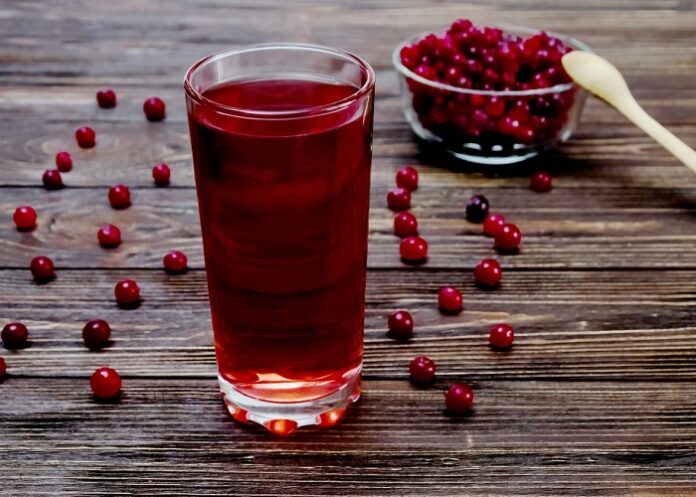Unsweetened cranberry juice is often recommended by doctors as a treatment for urinary tract infections (UTIs), and yet given a lack of solid scientific evidence, some researchers have argued that “any continued promotion” of this remedy goes beyond the data.
Researchers at Bond University in Australia are now inclined to disagree, after their recent meta-analysis, which includes 20 studies, suggests cranberry juice may not be so useless after all, reports Science Alert.
Consumed regularly for weeks to months in randomised controlled trials (RCTs), the risk of developing a UTI has been found to drop, they suggest.
Comparing the results of five such trials, the team found that drinking cranberry juice led to a 27% lower rate of UTIs than a placebo liquid.
This result was reported with moderate certainty, which means the true effect size is probably close to the estimation.
They also found that those drinking cranberry juice had a 49% lower rate of antibiotic use than the placebo group.
This doesn’t mean that cranberry juice is a replacement for modern medicine, but it does suggest the fruit drink can help keep recurrent infections at bay and reduce the future need for antibiotics.
“With moderate to low certainty, the evidence supports the use of cranberry juice for the prevention of UTIs,” wrote the researchers.
“While increased liquids reduce the rate of UTIs compared with no treatment, cranberry in liquid form provides even better clinical outcomes in terms of reduction in UTIs and antibiotic use and should be considered for the management of UTIs.”
To improve on the certainty of those results, more randomised controlled trials are needed.
These studies will have to tease apart how much cranberry juice needs to be consumed to have an impact on UTIs and for how long. They will also need to consider how cranberry juice affects people of different ages and sexes.
More than 60% of women in the US will get a UTI at some point in their life, and roughly a quarter of all those infections will recur again within a year.
Despite the common nature of the infection, doctors often prescribe the wrong antibiotics or wrong doses for UTIs. As a result, the bacteria behind these infections are growing resistant to many frontline medicines.
Some studies have found more than 90% of UTIs currently exhibit bacterial resistance to antibiotics, and without alternative treatments, some women are forced to live with lifelong recurrences.
Cranberries could be a useful tool to prevent those recurrences. They may not even need to come in juice form. A trial that was included in the Bond review found that compared with no treatment, cranberry tablets produced a 35% lower rate of UTIs.
The findings echo another meta analysis, published in April of 2023, that reviewed 50 trials and found the risk of UTIs and recurrent UTIs was significantly lowered by the intake of cranberries, delivered in juice, tablet, or powder form.
Unfortunately, those benefits were seen only in children and women with recurrent UTIs. None was observed for older adults, pregnant women, or people with bladder problems.
The current review from Bond University included trials that mostly looked at adult women, which means it’s unclear how well the results extend to other groups.
As new evidence emerges, however, it’s getting harder to dismiss the potential health benefits of the little red fruit from North America.
The meta analysis was published in the European Urology Focus.
Study details
Cranberry Juice, Cranberry Tablets, or Liquid Therapies for Urinary Tract Infection: A Systematic Review and Network Meta-analysis
Christian Moro, Charlotte Phelps, Vineesha Veer et al.
Published in European Urology Focus on 18 July 2024
Abstract
Background and objective
With more than 50% of women suffering from at least one episode of urinary tract infection (UTI) each year and an increasing prevalence of antimicrobial resistance, efforts need to be made to clearly identify the evidence supporting potential non-drug interventions. This study aims to compare the effects of cranberry juice, cranberry tablets, and increased liquids for the management of UTIs.
Methods
PubMed, Embase, and Cochrane CENTRAL were searched for randomised controlled trials. The primary outcome was the number of UTIs, and the secondary outcomes were UTI symptoms and antimicrobial consumption. A risk of bias assessment was performed using the Cochrane risk of bias tool, and the certainty of evidence was assessed using Grading of Recommendations Assessment, Development and Evaluation.
Key findings and limitations
A total of 20 trials (3091 participants) were included, with 18 studies highlighting a 54% lower rate of UTIs with cranberry juice consumption than no treatment and a 27% lower rate than placebo liquid. Cranberry juice also resulted in a 49% lower rate of antibiotic use than placebo liquid and a 59% lower rate than no treatment, based on a network meta-analysis of six studies. The use of cranberry compounds also reduced the prevalence of symptoms associated with UTIs.
Conclusions and clinical implications
With moderate to low certainty, the evidence supports the use of cranberry juice for the prevention of UTIs. While increased liquids reduce the rate of UTIs compared with no treatment, cranberry in liquid form provides even better clinical outcomes in terms of reduction in UTIs and antibiotic use and should be considered for the management of UTIs.
Science Alert article – Cranberry Juice Really Does Have Promising Benefits For UTIs (Open access)
See more from MedicalBrief archives:
Cranberry juice helps with UTIs, Australia meta-analysis finds
Most women receive inappropriate treatment for uncomplicated UTIs
Antibiotics may increase, not reduce, risk of further UTIs – Harvard/MIT/Washington study

